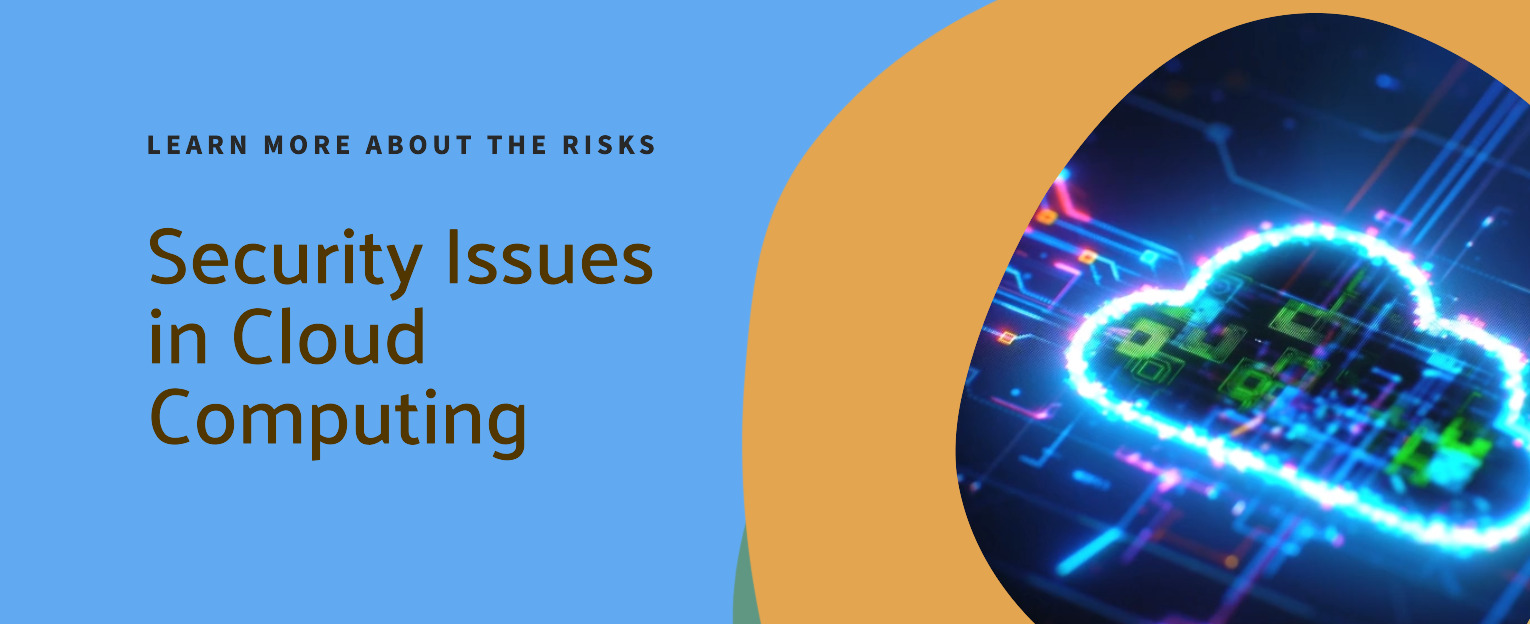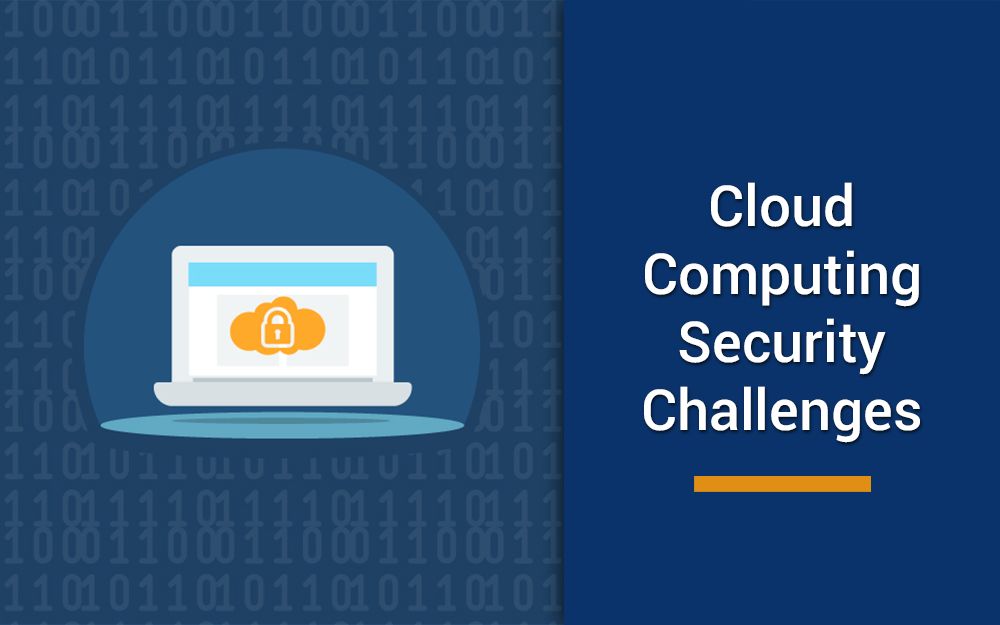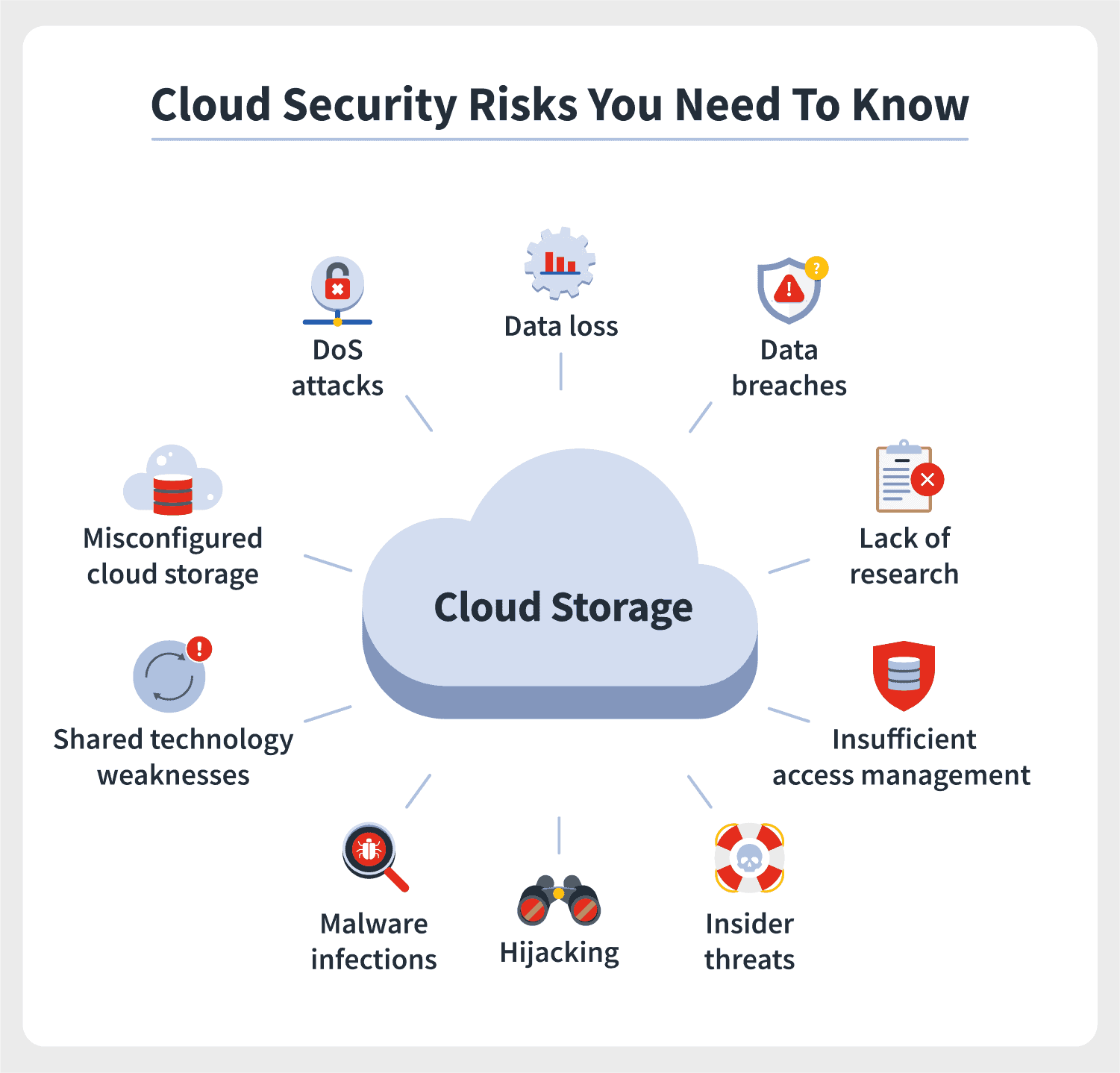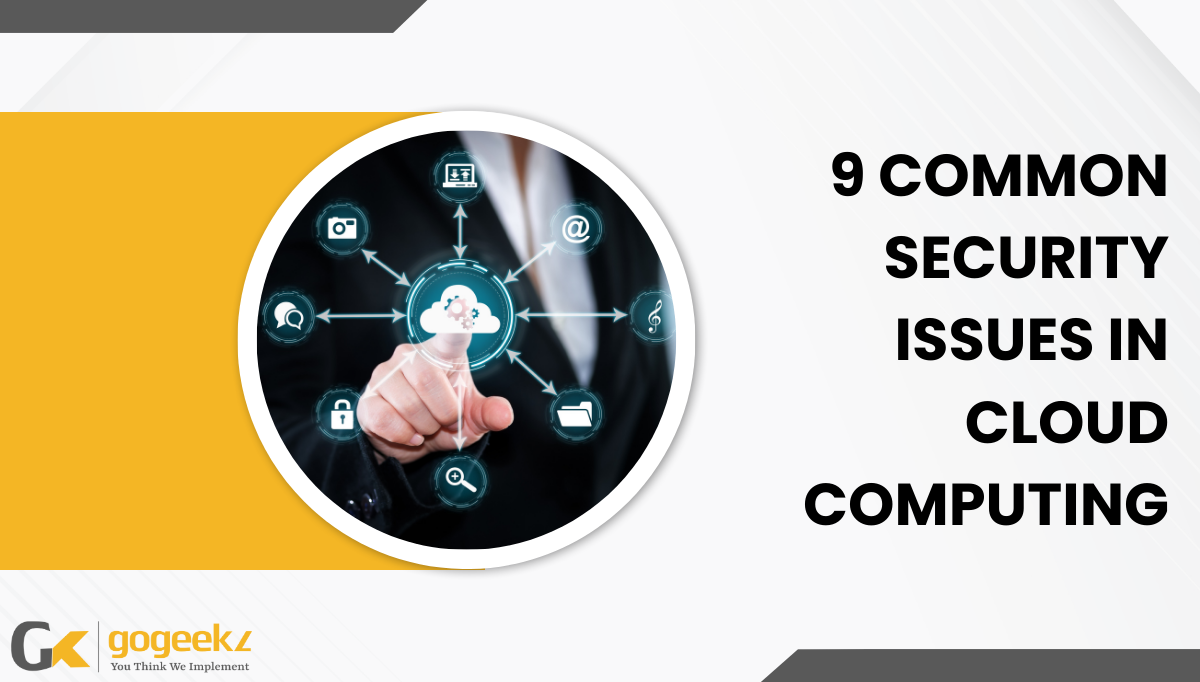9 Common Security Issues in Cloud Computing
In the era of digital transformation, cloud computing has emerged as a cornerstone for businesses aiming to innovate, scale, and compete in the global marketplace. However, as organizations in Canada and the US increasingly migrate their operations to the cloud, understanding the nuances of cloud computing security becomes paramount.

This blog post delves into the critical aspects of what cloud security entails, explores the various security issues in cloud computing, and offers insights into effective cloud security management strategies. GoGeekz’s goal is to empower small and medium-sized businesses (SMBs) with the knowledge to navigate the complexities of cloud security, ensuring a secure and prosperous journey in the cloud-centric world.
What is Cloud Security?
Cloud security encompasses a set of policies, technologies, controls, and practices designed to protect cloud-based systems, data, and infrastructure. From safeguarding data privacy to ensuring regulatory compliance and defending against cyber threats, cloud security management is a multi-faceted challenge that requires a comprehensive approach. As businesses transition to the cloud, understanding the foundational elements of cloud security is the first step towards building a resilient digital ecosystem.
However, security issues in cloud computing can arise, posing security risks and challenges. To mitigate these risks, implementing managed cloud security solutions is essential. Addressing data security in cloud computing is crucial to maintain trust and integrity within the cloud environment.
The Core Security Challenges in Cloud Computing
The core security challenges in cloud computing are multifaceted and require diligent attention. Cloud security management encompasses various aspects, including data security in cloud computing and addressing security issues in cloud computing. Understanding what is cloud security is crucial for mitigating security risks of cloud computing, which include data breaches, unauthorized access, and compliance violations. Managed cloud security services offer proactive solutions to these risks, ensuring round-the-clock monitoring and threat detection.
Check out our other blog: Cloud vs On-Premises

However, businesses must also navigate security challenges in cloud computing such as misconfigurations and inadequate access controls. Effectively addressing these challenges demands a comprehensive and adaptable approach to cloud computing security.
Check out our other blog: What is Unified Threat Management?
What are the Security Risks of Cloud Computing?
The risks include data breaches, compromised credentials, account hijacking, and the vulnerability of APIs. Each of these risks requires a targeted strategy to mitigate, such as the implementation of stronger password policies, two-factor authentication, and regular security assessments.
As businesses migrate to the cloud, understanding and addressing the myriad of security challenges in cloud computing becomes paramount. Here are some critical concerns:
 Data Security in Cloud Computing:
Data Security in Cloud Computing:
Data security remains the cornerstone of cloud computing security. With businesses storing vast amounts of data on the cloud, ensuring its integrity, confidentiality, and availability is crucial. Techniques like encryption, tokenization, and the use of secure access controls are fundamental to safeguarding data.
 Managed Cloud Security:
Managed Cloud Security:
Managed cloud security services offer a comprehensive approach to securing cloud environments. These services provide businesses with expertise and resources that may be lacking in-house, encompassing everything from round-the-clock monitoring to advanced threat detection and response strategies.
 Misconfiguration and Inadequate Change Control:
Misconfiguration and Inadequate Change Control:
Cloud environments are complex and dynamic, making them susceptible to misconfiguration. Inadequate change control processes can further exacerbate this risk, leading to vulnerabilities that attackers can exploit.
 Security Challenges in Cloud Computing:
Security Challenges in Cloud Computing:
Beyond the risks, there are numerous challenges, including managing user access, securing transactions over the internet, and maintaining privacy. Overcoming these challenges necessitates a robust cloud security management framework that adapts to the evolving threat landscape.
 Lack of Cloud Security Architecture and Strategy:
Lack of Cloud Security Architecture and Strategy:
Without a clear security architecture and strategy, SMBs can find themselves exposed to various threats. A piecemeal approach to security can leave gaps that are easy for attackers to exploit.

 Insecure Interfaces and APIs:
Insecure Interfaces and APIs:
CSPs offer interfaces and APIs that customers use to interact with cloud services. These interfaces must be securely designed to prevent unauthorized access and data leakage.
 Account Hijacking:
Account Hijacking:
Cybercriminals use phishing, fraud, and software exploits to hijack cloud service accounts. Once they gain access, they can manipulate data, eavesdrop on transactions, and redirect clients to illegitimate sites.
 Advanced Persistent Threats (APTs):
Advanced Persistent Threats (APTs):
APTs are complex attacks in which an unauthorized user gains access to a system or network and remains undetected for an extended period. Cloud environments can be particularly vulnerable to APTs due to the vast amount of accessible data.
 Legal and Regulatory Compliance:
Legal and Regulatory Compliance:
SMBs must navigate a complex landscape of regulations governing data protection and privacy. Compliance becomes even more challenging in a cloud environment, where data may be stored across multiple jurisdictions.
Check out our other blog: What is Disaster Recovery?
Strategies for Robust Cloud Security Management
To ensure robust cloud security management, it’s essential to first understand what is cloud security and the security risks of cloud computing. Adopting a proactive approach involves implementing stringent data security in cloud computing measures, including encryption and access controls.
Managed cloud security services offer expert guidance and round-the-clock monitoring to mitigate security issues in cloud computing effectively. Addressing the security issues in cloud computing involves a multi-faceted approach tailored to the specific needs of the business. Here are several strategies businesses can employ:
 Comprehensive Risk Assessment:
Comprehensive Risk Assessment:
Begin with a thorough assessment of potential vulnerabilities within your cloud environment. This assessment should inform your security strategy, helping you prioritize the areas of highest risk.
 Adopt a Zero-Trust Security Model:
Adopt a Zero-Trust Security Model:
Operate on the principle of “never trust, always verify.” This means implementing strict access controls and continuously verifying the security status of all devices and users, irrespective of their location in relation to the network perimeter.

 Data Encryption:
Data Encryption:
Encrypt data at rest and in transit to ensure that even if data is intercepted or accessed by unauthorized individuals, it remains undecipherable and useless to them.
 Regular Security Training:
Regular Security Training:
Human error remains a significant threat to cloud security. Regular training for all employees on the latest security threats and best practices can reduce the risk of accidental data breaches or compromised credentials.
 Leverage Managed Cloud Security Services:
Leverage Managed Cloud Security Services:
For SMBs, leveraging managed cloud security services can provide access to expert resources and cutting-edge technology. These services can manage the complexity of cloud security, allowing businesses to focus on growth and innovation.
 Ensure Compliance:
Ensure Compliance:
Stay abreast of the latest regulatory requirements related to data protection and privacy, such as GDPR, HIPAA, or PIPEDA in Canada. Ensuring compliance not only protects you from legal repercussions but also strengthens your security posture.
Check out our other blog: Phishing Prevention and Email Safety
Conclusion
As SMBs in Canada and the US increasingly adopt cloud computing, understanding the intricacies of cloud computing security becomes imperative. By recognizing the prevalent security issues in cloud computing and implementing robust cloud security management practices, businesses can navigate the challenges and leverage the cloud’s full potential securely.
Remember, effective cloud security is not just about deploying the right technologies; it’s about creating a culture of security awareness across the organization. With the right approach and resources, such as managed cloud security services, SMBs can achieve a secure and compliant cloud environment, driving business success in the digital age.

For businesses looking to navigate the complex landscape of cloud security, GoGeekz offers comprehensive solutions tailored to your needs. With our expertise in cloud security management, we can help you mitigate the security risks of cloud computing, ensuring your data remains secure, and your operations compliant. Explore our services and take the first step towards a secure cloud computing environment.
FAQs
Industry Experiences
Innovative services for your business
We’re dedicated to making your businesses reliable, efficient, and safe.
We’re a one-stop solution for everything IT you need. Whatever you need, we got you covered:
Cloud computing security encompasses a set of policies, controls, procedures, and technologies that work together to protect cloud-based systems, data, and infrastructure. With cloud computing now integral to businesses, its security is paramount to protect sensitive information from theft, data leakage, and deletion.
For SMBs, this means ensuring your data is as secure in the cloud as it would be in a physical data center. To ensure your cloud environment is secure, GoGeekz provides managed cloud security services that are tailored to your specific needs.
Cloud security, also known as cloud computing security, refers to the discipline and practice of protecting your cloud computing environment from both external and internal cybersecurity threats. Cloud security is more flexible and scalable than traditional IT security, as it’s designed to handle the dynamic nature of cloud computing platforms.
It often involves a shared responsibility between the service provider and the business. If your SMB is moving to the cloud, GoGeekz can help you navigate the complexities of cloud security management effectively.
Certainly! The main security issues in cloud computing include data breaches, data loss, account hijacking, service traffic hijacking, insecure interfaces and APIs, lack of due diligence, and the shared technology vulnerabilities. Each of these issues can compromise your business data and operations if not properly managed.
To safeguard your business, it’s crucial to adopt robust cloud security management practices. For specialized assistance in protecting your cloud infrastructure, contact GoGeekz for expert managed cloud security services.
Data security in cloud computing involves various strategies and technologies to protect data privacy, ensure data integrity, and prevent unauthorized users from accessing or compromising your data. It includes encryption, identity and access management, and regular security audits.
Data security is a top priority for SMBs as a breach can be detrimental to your reputation and finances. To address this, GoGeekz offers comprehensive security solutions that tackle the specific security challenges in cloud computing your business may face.
The security risks of cloud computing include exposure to cyber-attacks such as phishing, malware, and ransomware; data breaches due to insecure APIs; and potential data loss from inadequate backup strategies.
Preparing for these risks requires a proactive approach that includes employing a robust managed cloud security strategy, continuous monitoring, and incident response planning. For SMBs looking to strengthen their cloud defenses, GoGeekz is ready to assist with strategic planning and implementation to overcome these security challenges in cloud computing.




